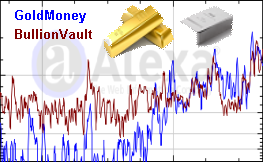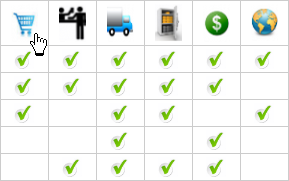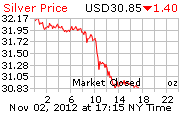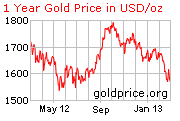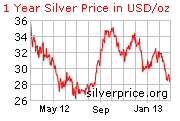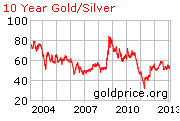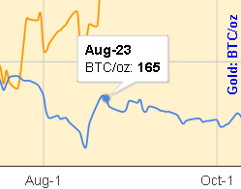Protection of Savings Against Inflation in Malaysia
An article lifted off The Gold Standard Issue #6 ● 15 June 2011 published by the Gold Standard Institute.
Inflation! Inflation Everywhere!
Over the years, many in Malaysia have experienced continuous surges in the prices of food, energy and houses. Based on data in the official website of the Department of Statistics, Malaysia, the average inflation rate is 2.2% p.a. or a total inflation of 24.4% compounded over ten years from 2000 to 2010.
In the first quarter of 2011, inflation rate was 2.8% y.o.y. and in March 2011, 4.7% y.o.y. for food. Many Malaysians doubt the official inflation figures, as their personal experience indicates much higher rates of increase for grocery energy and housing bills.
As a result, many young people complained rapid inflation has put house ownership beyond them.
According to the National House Buyers Association, the property prices in urban areas in Penang and Kuala Lumpur rose by up to 40% last year, mainly fuelled by low interest rates and a surge by speculative buying. The average price of a Kuala Lumpur house is now about RM485,000 or roughly 9 times the average urban household annual income of RM54,000.
The Demographia International Housing Affordability Survey rates property prices of 5.1 times or more on median income, as “severely unaffordable”.
Many with savings feel that their money is buying less and less. Many Malaysians have used a number of ways to protect their savings against inflation. The following are some common and popular methods.
Note: As the effect of debasement of currency on prices is not always immediate, we should not be distracted by short term volatility of rates and prices, hence only the long term average rates (compounded) over the last 10 years are used to discuss their effectiveness.
1. Buying houses
Many in Malaysia have bought houses to live in as well as for investment. One can put down 10% deposit, and gets a housing loan if one’s income qualifies for it. The current mortgage interest rate is about 5% per annum. The rental yield ranges from 4% to 7% p.a. which is sufficient to cover interest payment.
Over the decade (2000-2010) the average rise in price of houses is 3.5% p.a. (Data source: Valuation and Property Services Department, Malaysia-JPPH). This rate is slightly higher than the average official inflation rate of 2.2% p.a.
In the last 12 months, the price of houses have surged, with Kuala Lumpur house price index Surging by 9.9% y.o.y. in Q3 2010.
Many speculators have bought houses using flexible housing loan requiring only minimum monthly repayment of interest), resulting in a levered gain of 10 times in a rising market over last 10 years.
On average, an investment of RM100,000 in a million Ringgit house in Malaysia in 2000 will yield a gain of RM410,000 in the year 2010 (compounding effect). This figure does not take into account the maintenance cost of the house and local taxes such as quit rent and assessment.
2. Bank fixed deposit
The bank fixed deposit is currently paying less than 3% interest p.a., which hardly covers the price surge of essential goods, and housing. Many still put money in fixed deposit for liquidity purpose, as it takes only 5 minutes to get cash from them compared to 4-10 months required to liquidate a house.
3. Stock Market
Many investors also put some savings in stocks and shares in Malaysia, and over 10 years, (2000-2010), the Kuala Lumpur Composite Index rose an average rate of 3.2% p.a. (compounded and without taking dividend into account), which is only slightly above the official inflation rate.
4. Gold
In order to encourage local Malaysians to save in gold, the Malaysian Government
started, in July 2001, to issue the locally minted coins in pure gold (9999) called Kijang Emas (The golden Mouse Deer). These coins in ¼ oz, ½ oz and 1oz are minted by Bank Negara Malaysia and made available throughout Malaysia at the Malayan Banking (Maybank) branches which sell the gold coins in Ringgit at rates published daily.
In July 2001, the price of a 1oz Kijang Emas was RM1082 and by Dec 2010, it was selling at RM4,624. Using the average yearly price over the last ten years (2001-2011), the price of local gold coins have risen at an average compounding rate of 15.7% p.a.
A history of 1oz Kijang Emas Gold Coin Selling Price in Ringgit Malaysia
Coins bought in 2001 and sold them in 2010 would get a good appreciation of 15.2% p.a. or total gain of 258% in Ringgit value (taking into account the 4% spread). This rate is definitely higher than the official inflation rate.
Preferred Method by Malaysians From the amount of money invested, it is obvious most Malaysians with high savings prefer to invest in houses over the hoarding of gold as a method to protect their savings from losing their purchasing power. The main reasons are:
1. Banks are keen to make housing loans to Malaysians to invest in houses, and will never lend money to people to buy gold. Hence house buyers get leverage in the return on their investment in a rising house market
2. Most people do not understand how the fiat monetary system functions, and they do not understand the importance role of gold in the monetary system. Many Malaysians are influenced by Warren Buffett and his most famous quote about gold:
Gold gets dug out of the ground in Africa, or somewhere. Then we melt it down, dig another hole, bury it again and pay people to stand around guarding it. It has no utility. Anyone watching from Mars would be scratching their head.
Note: on a yearly average basis, Berkshire Hathaway appreciated in USD value of 22% p.a. over the last 44 years (1966 – 2010), and Warren Buffett was voted by money managers as the greatest investor of the last century. However, over the last 9 years (2001 to 2010) his average yearly performance of 5.3% p.a. was consistently beaten by gold’s 15.7% p.a. appreciation in Ringgit value.
When confronted with the above quotation of Warren Buffett (WB), my friend Mr.GB would always reply with the following story:
One day, two aliens from the Planet A.S. (All Saints) visited Earth, and they met Earthling GB.
Alien WB said, “I am amazed by the practice of you Earthlings. Why would you use locks to lock your doors? Why do you use gold as money?”
Earthling GB: “We use locks to keep thieves out.”
Alien WB: “In Planet A.S. throughout all generations, people are honest and we have the DNA of the Saints. The A.S. people including our leaders are honest, and always have the interest of their people in their hearts. There is no crime or thief in A.S., hence no locks, no policeman or security guards. They have no utility in our Planet A.S. We do not need to elect our leaders. It is a waste of time & resources, and we definitely do not use the gold standard, as our leaders are perfectly honest and have infinite wisdom; they know how much money to print and will not steal the savings of the people via the stealth tax or printing of more fiat money than necessary.”
Alien CM said: “You can’t eat locks! In Planet A.S. those who bought locks are irrational and immoral. These lock bugs are jerks.”
Earthling GB: “But here on Earth, we need locks, policeman, security guards, and gold to prevent theft of our properties including our savings. Only the thieves and crooks in disguise always discourage us to invest in locks. We have very few Mother Teresas on Earth. We must have frequent elections of leaders. We use gold standard as a fair accounting tool, and I can tell you these activities are not a waste of time or resources as they improve the quality of life and productivity of society.”
Conclusion
In the last 10 years it appears that a good way to protect savings against inflation in Malaysia is by converting saving into gold coins or investing in houses by taking a mortgage.
Using leverage of a housing loan, one can gain wealth faster in a rising housing market, but then history tells us all bubbles will pop one day.
With the house price affordability of 9 times over the median household income, we in Malaysia may run out of buyers one day and when the housing bubble pops, many leveraged investors will find their wealth shrinking faster than it rose in the last decade.
Philip T
-
How to buy Kijang Emas and other gold (& silver) coins in Malaysia.
-

